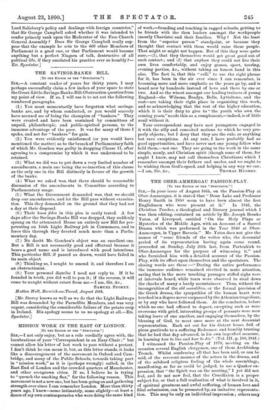THE SAVINGS-BANKS BILL.
[TO THE EDITOR OF THE " SPECTATOR." J
SIR,—A constant reader of yours for thirty years, I may perhaps successfully claim a few inches of your space to state the Great-Little-Bavings-Banks-Bill-Obstruction question from my point of view. If so, I will use it to set out the following numbered paragraphs.
(1.) You must momentarily have forgotten what savings- banks are, and by whom conducted, or you would scarcely have accused me of being the champion of "bankers." They were created and have been sustained by committees of unpaid, philanthropic, and public-spirited persons, to the immense advantage of the poor. It was for many of these I spoke, and not for " bankers " for gain.
(2.) You were evidently uninformed (or you would have mentioned the matter) as to the breach of Parliamentary faith of which Mr. Goschen was guilty in dropping Clause 11, after agreeing to a compromise by which it was understood to be retained.
(3.) What we did was to put down a very limited number of amendments, a main one being the re-insertion of this clause as the only one in the Bill distinctly in favour of the growth of the banks.
(4.) What we asked was, that there should be reasonable discussion of the amendments in Committee according to Parliamentary usage.
(5.) What the Government demanded was, that we should drop our amendments, and let the Bill pass without examina- tion. This they demanded on the ground that they had not a day at their disposal.
(6.) Their bona fides in this plea is easily tested. A few days after the Savings-Banks Bill was dropped, they suddenly sprang on the attenuated House an entirely new Bill for per- petrating an Irish Light Railway job in Connemara, and to force this through they devoted much more than a Parlia- mentary day.
(7.) No doubt Mr. Goschen's object was an excellent one. But a Bill is not necessarily good and effectual because it bears a good name and is introduced with good intentions. This particular Bill, if passed as drawn, would have failed in its main object.
(8.) Thinking so, I sought to amend it, and therefore I am an obstructionist.
(9.) Your personal diatribe I need not reply to. If it be founded in truth, you did well to pen it; if the reverse, it will come to naught without retort from me.—I am, Sir, &c.,
SAMUEL STOREY.
Hutton Hall, Berwick-on-Tweed, August 18th.
[Mr. Storey knows as well as we do that the Light Railways Bill was demanded by the Parnellite Members, and was very urgent, considering the considerable failure of the potato crop in Ireland. His apology seems to us no apology at all.—En. Spectator.]


































 Previous page
Previous page